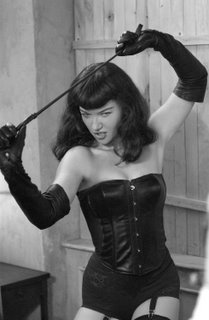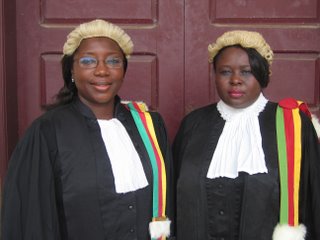
THE NOTORIOUS BETTIE PAGE
Gretchen Mol puts the va-va voom back into her stalled career with THE NOTORIOUS BETTIE PAGE (an HBO Films/Picturehouse release), a likeable biopic about the one-time pin-up sensation, who treated her bondage photos as a laugh and a giggle as the government and society-at-large fretted and fulminated. Mol, a Next Big Thing who never happened in the late 90's, clearly relishes her second shot at the limelight, and is a dead ringer for Page, a vivacious brunette who came to her curious underground celebrity at a time when Marilyn Monroe was the cultural ideal.
But Page (still with us, a Christian who has moved on from her past and is said to abhor this film) is an enigma, and Mol captures some of her peekaboo, what-do-you-think-I'm-hiding quality, which as much as her beauty and willingness to be photographed in questionable poses surely helped make her pictures hot items. No stranger to sexual abuse, Page nevertheless maintains a basic innocence (as a mask, or as something ingrained in her character, the movie does not say) and for me Mol's performance recalled Daryl Hannah's mermaid in SPLASH, another guileless creature, with a whip and fish-net stockings rather than a tail and scales.
Artfully photographed, by Mott Hupfel, in noir-ish black and white, with vignettes that replicate a creamy, bygone Technicolor, BETTIE PAGE is framed around the subject's impending testimony before the government's Kefauver Commission, which was intended to sniff out the nation's burgeoning porn market. [David Straithairn, last seen on the side of the angels in GOOD NIGHT, AND GOOD LUCK., puts on the black hat of the puritans this time as the disapproving Estes Kefauver, senator of Page's home state, Tennessee.] In an irony, Page's career as a model, once she leaves the disappointments of her early, confined life in Nashville behind for New York, is shaped by a police officer, Jerry Tibbs (Kevin Carroll), a part-time photographer who spots her on Coney Island, and shows her how to pose and arrange her hairstyle. [Tibbs is also black, an interesting detail that the script, by Guinevere Turner and director Mary Harron, lets hang in the air.] She makes the rounds at private photography clubs, where the male shutterbugs are instantly ejected if they dare to touch the models--the movie is at its best in capturing this unfamiliar, dawn-of- Playboy subculture, with its own codes and dictates.
In time, she catches the eye of photographers Irving Klaw (Chris Bauer) and his half-sister, Paula (Lili Taylor), who put her in boots and bondage gear and elevate her to clandestine super-stardom, which reverberates today (Jennifer Connelly played the Page-inspired heroine of 1991's THE ROCKETEER, based on a popular graphic novel). But Page herself left modeling, which included higher-profile work with photographer Bunny Yeager (Sarah Paulson), in 1957, and renewed her Christian faith. Living in virtual obscurity, she has never shared in the bounty accrued from the avid resale, appropriation, and collection of her photographic past.

Harron's film concentrates on Page's quirky glory years and provides no answers as to her mysterious after-life away from the cameras. From Page's constant bemusement at the latest outrage the Klaws ask of her it was, I assume, fun while it lasted (not that it didn't upset her off-camera relationships), and I was surprised that Harron, who made the unappealingly killjoy I SHOT ANDY WARHOL and AMERICAN PSYCHO, found some fun in it. It's not a deep film (and, at 91 minutes, not a drawn-out one, either) but I think having her, Turner, and several female producers behind the camera made a distinct difference.
There's nothing lascivious about its treatment of Page, nor any jeering condescending toward her admirers--I'm not sure how many male filmmakers could have been trusted to extend equal empathy to subject and onlooker in quite the same, matter-of-fact way. [They're surprisingly neutral, too, about Page's conversion--the square, unhip government comes in for the greatest mockery.] Its most uncomfortable scene, beautifully acted by Mol, is its highlight, as Page accedes to a photographer's nervous request to pose completely nude--she can't quite believe she's doing it, and, feeling protective, we can't quite believe she's doing it, either. THE NOTORIOUS BETTIE PAGE puts us in the odd position of not wanting to get something more than we bargained for, the titillatingly dressed Bettie in her guises. But the clothes come off. And everyone--Page, photographer, the filmmakers, and the audience--handles the naked truth with unexpected, and perhaps uncommon, maturity.
[Photo credits: Abbott Genser, 2005 Picturehouse]

SISTERS IN LAW
Whatever problems I had with SISTERS IN LAW (a Women Make Movies release), a sharply observed documentary now playing at Manhattan's Film Forum, largely evaporated in the wake of one of its closing sequences. The film follows the trials (literally) and tribulations of state prosecutor Vera Ngassa (left, photo) and court president Beatrice Ntuba (right), who chafe at the centuries-old patriarchal attitudes that hold sway in the Muslim village of Kumba in Cameroon, West Africa. We see them dispense justice in three cases, one involving an abused six-year-old girl, at first nearly comatose from pain and shame; a woman who accuses a man of rape, leading to breathtakingly chauvinistic grandstanding by the defendant's dapper lawyer, who could have stepped out of an episode of BOSTON LEGAL; and another plaintiff trying to divorce her casually cruel, much-older husband, to the amazement of her friends.
The filmmaker, British documentarian Kim Longinotto (who specializes in this sort of women-under-duress examination; her prior work includes DIVORCE IRANIAN STYLE), adopts Frederick Wiseman's aesthetic--outside of a title card or two, there is no narration, and we're simply thrust into the situation, in essence discovering it much like the two women. This presents a problem. While I have no idea where Wiseman is taking me in an exploration like PUBLIC HOUSING or his DOMESTIC VIOLENCE pictures (which the more optimistic SISTERS IN LAW is in some ways kin to), I have some nodding, second-hand familiarity with the institutions and culture, and that's often (not always) map enough. I have less of a guidebook for SISTERS IN LAW, however; its portrait of Muslim life and culture is respectful and non-judgmental, but without some prior background I felt at a remove from it, however ingratiating, world-wise, and funny Ngassa and Ntuba are in their element. [Unaccustomed to women as determined and self-reliant as these two, the males in their orbit are often shown lapsed into stunned silence when with a sharp word or phrase they slap back the upper hand the men have, or think they have.]
And then there is that great scene. Justice done, the child abuser is sent off to jail. Incarcerated, she lacks medicine, which Ngassa brings her. "You hate me," she sobs, a pitiable figure. "No," says Ngassa, who promises to continue her helping hand. With this one small gesture, captured by Longinotto's camera, I felt that here was a chance for a cycle of abuse and neglect to be broken, and was grateful for the film for bringing this modest, invaluable crusade to light. The world is a better place for their efforts.
[Photo credit: Women Make Movies]


No comments:
Post a Comment